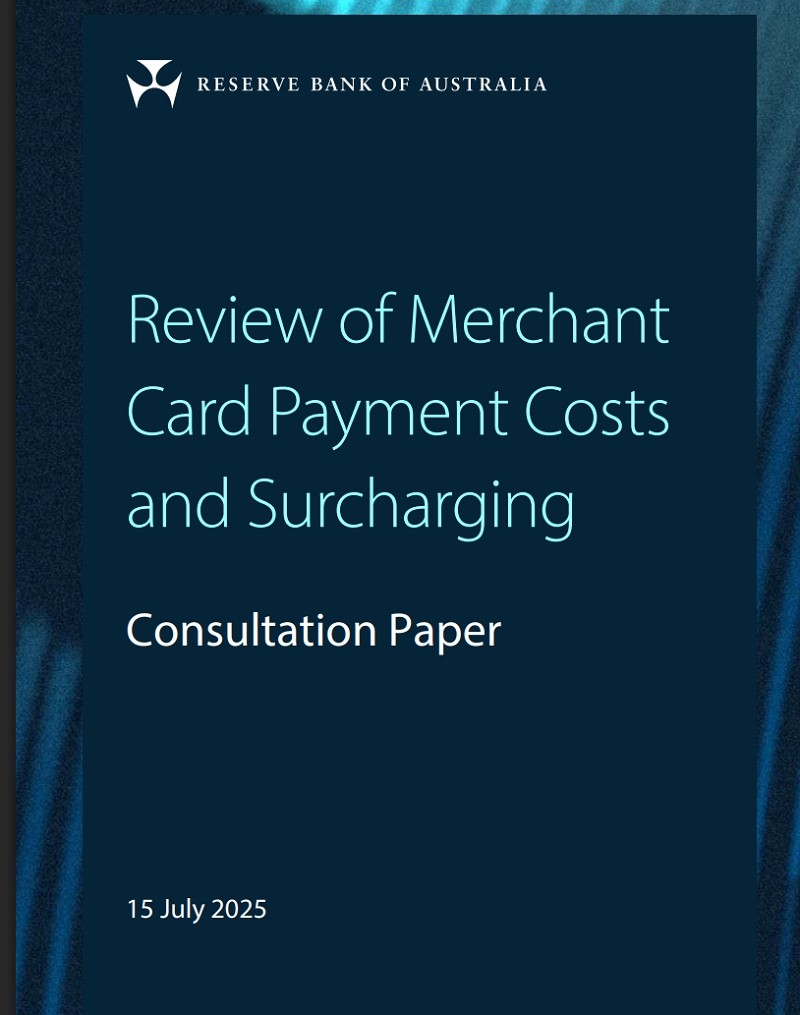
The Australian Labor Party made an election promise to eliminate debit card surcharges; this policy was supported to some degree by all major Australian Parties, so as day follows night, we can expect changes here. In response, the Reserve Bank of Australia (RBA), after looking into it, decided to float the idea of banning all surcharges on Australian Debit and Credit cards —but, strangely, not on overseas cards. Now, many of my clients have heard about the Reserve Bank of Australia's (RBA) proposed changes to merchant card payments, but most aren't clear about what's actually being discussed. There's a lot of noise out there, and too few people understand what the proposals mean for their day-to-day business operations. I was pretty stunned to find that many of the industrial bodies that represent them had not asked for their thoughts and then told them what they submitted on their behalf.
To cut through the confusion, I reviewed every official submission to the RBA's consultation—covering banks, card networks, business associations, consumer groups, and technology providers. I pulled out each central position, concern, and argument to show what's really being debated. It took some time, but the goal is to help business owners like you clearly see who supports what, who's opposed, and what that might mean in real-world terms. So below is a summary table outlining each key issue, why it matters, and where the main stakeholders stand. It’s designed to make a complex discussion easier for you to follow.
| Issue | Explanation | Why Matters | Stakeholders For | Stakeholders Against | Concerns |
|---|---|---|---|---|---|
| Ban Surcharging | Merchants could no longer charge extra fees for card payments (EFTPOS, Visa, Mastercard); surcharges would be banned. | Consumers save $1.2B/year; more straightforward pricing, but small businesses lose a cost recovery method—may need to raise prices or close. | CHOICE, Consumer Groups, Major Banks | COSBOA, Small Businesses, Travel Industry | Costs will be passed on to retailers, who may have to raise prices for all customers. |
| Lower Interchange Caps | RBA proposes cutting bank fees per transaction (debit: 10¢ to 6¢, credit: 0.5% to 0.3%). | Could save merchants $1.2B/year; helps small businesses most, but unclear if savings will actually be passed through. | CHOICE, Consumer Groups, Small Businesses, Retailers | Banks, Card Schemes, Fintech Australia | Banks may raise other fees; most of the costs are being ignored in the RBA study. |
| Issuer Cost Study Methodology Questioned | Banks and card schemes say the RBA's cost study is flawed (only 11 issuers surveyed; key costs excluded). | If flawed, the basis for fee caps may be incorrect; small-issuer costs often exceed caps. | Card Schemes | RBA, Consumer Groups | If the study is flawed, the conclusions are dubious. |
| American Express Not Regulated | AmEx, as a three-party scheme, is not subject to a cap, while Visa/Mastercard are capped. | Creates a competitive imbalance; may lead merchants to stop accepting AmEx. | Banks, Card Schemes | AmEx, Current Regulations | It is a market distortion |
| Buy Now Pay Later (BNPL) Regulatory Arbitrage | BNPL providers (Zip, AfterPay, Klarna) charge merchants much higher fees (~5.3% vs 1.8% for cards); they are currently unregulated. | Banning surcharging on cards but not BNPL steers customers to higher-cost BNPL methods. | Macquarie Bank, Consumer Advocates | BNPL sector | BNPL offers consumers a better deal, but what is wrong with merchants charging more to recover the costs of that better deal? |
| Mobile Wallet Fees (Apple Pay) | Apple Pay takes ~15 basis points per transaction from issuers; with lower interchange, this is half or more of what’s left for banks. | Not reflected in the RBA’s study; costs go offshore; increases as wallets become more common. | Banks | Apple, Wallet Providers | Issuer margins shrink; if the banks do not pay for higher costs, who will?. |
| Commercial Card Exemption | Business credit cards are usually exempt elsewhere; Australia proposes regulating at the same rates as consumer cards. | Commercial cards support working capital for SMEs; new cap threatens their viability; 700,000 cards in use. | Card Schemes (e.g. Mastercard) | RBA, Current proposal | Why should a business credit card cost more? |
| Innovation & Fraud Prevention Investment | Interchange fees help fund fraud detection technology, cybersecurity, tokenisation, and payments innovation. | Less interchange = less funding for such investments; risks more fraud, declined transactions, and security breaches. | Banks, Card Schemes | Consumer Groups, RBA | Underfunded security can hurt merchants and customers alike. Fraud protection is critical. |
| Smaller Issuers & Fintech Competition | Small banks and fintechs have costs above the proposed cap, making it hard for them to compete. | Risk of market consolidation to big banks; less innovation and higher costs in the long term. | Fintech Australia, Small Issuers | Big Banks | Fewer issuers = less choice. It possibly offers lower merchant fees. |
| Newsagent/Lottery Agent Sector: Agency Model | Agency operators (newsagents, lottery) receive fixed commissions, with no control over product prices; transaction fees may exceed the commission earned. | Zero pricing power; costs can erase margin; may lead merchants to drop cards or close. | COSBOA, Small Business Advocates | RBA (issue not addressed) | Agency businesses like newsagents of lotto can't offset proposed cost increases. |
| Thin Margins | Retailers, travel agencies, hotels, and restaurants often operate at 0-4% profit margins. Card costs are a significant burden. | Surcharge bans remove cost recovery; foreign card fees remain; some sectors may not survive any new cost shock. | Travel Industry, ATIA | RBA, Consumer Groups | Any cost increase can be dangerous for thin-margin businesses. |
| Scheme Fee Regulation & Asymmetric Regulation | Scheme fees (Mastercard/Visa charges to banks) are unregulated and rising, potentially offsetting the benefits of interchange cuts. | If only interchange is capped but scheme fees aren’t, savings may not reach merchants (as the UK saw). | CHOICE, Retailers, Small Businesses | Card Schemes | Interchange fees are just one of many fees, and they are the only ones currently proposed for regulation. If interchange fees are eliminated, what will take their place? |
| Transparency Requirements | Payment processors must publish fee schedules by card type and method, making costs clear for merchants. | Helps merchants compare, puts competitive pressure on processors; broad support. | All parties are generally supportive | Some concern over reporting format/frequency/definitions | Merchants deserve transparency regarding their expenses; they need to understand what they are being charged. |
In summary, Many of the proposed changes from the RBA have mixed effects. They could help consumers and some businesses, but may also push new costs onto retailers with limited ability to absorb them. For small, local shops—especially those operating on agency models or with very tight margins- it's essential to understand these effects and engage in the debate.
I hope this helps you follow the current debate.
Written by:

Bernard Zimmermann is the founding director of POS Solutions, a leading point-of-sale system company with 45 years of industry experience, now retired and seeking new opportunities. He consults with various organisations, from small businesses to large retailers and government institutions. Bernard is passionate about helping companies optimise their operations through innovative POS technology and enabling seamless customer experiences through effective software solutions.


